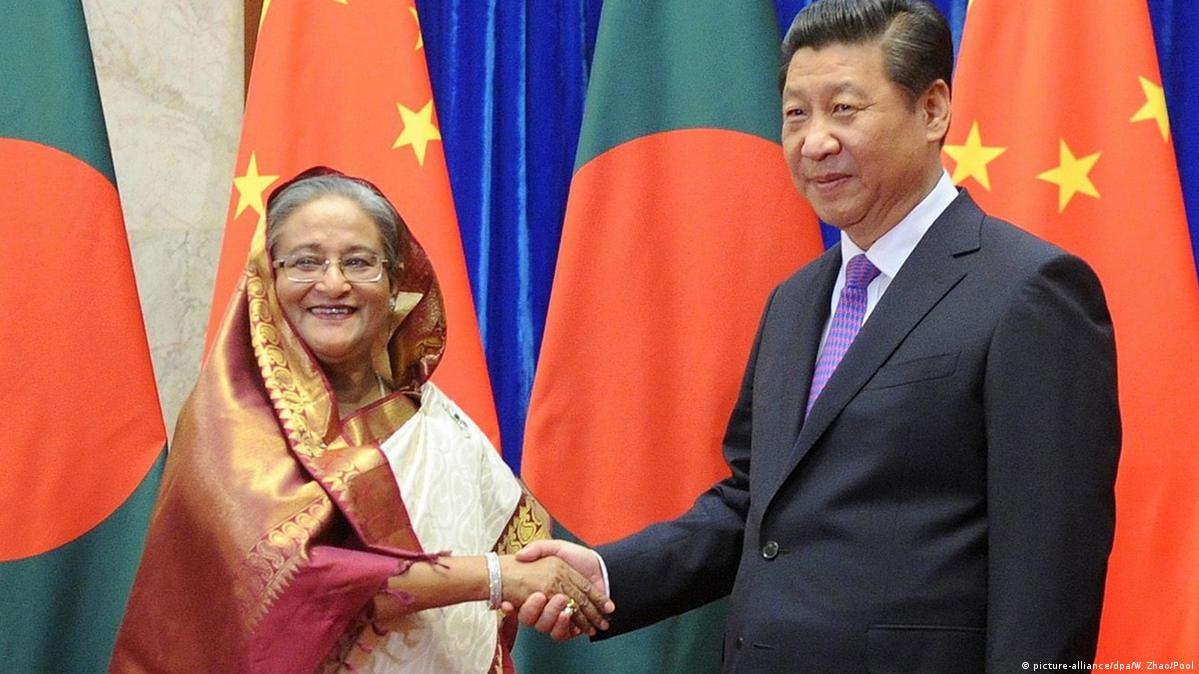Is China Tightening Its Grip on Bangladesh?
Marzana Mahnaz | 11 February 2024
The past year has been full of high-level summits with players from all the global powers. The year contained several multilateral discussions among world leaders, mostly bearing development, economic, and SDG plans. Prime Minister Sheikh Hasina showed her calculated steps to work with all the global powers by simultaneously participating in the BRICS summit at Johannesburg with the hope of joining the coalition and also made her first visit to the G20 summit at New Delhi as a guest member country. After visiting the highly distinguished meeting, the Prime Minister ensured Bangladesh had a part in China’s third Belt and Road Initiative Forum and the first high-level meeting of the Global Action Forum for Shared Development.
The third BRI Forum 2023 marked the 10th anniversary of the ambitious and most expensive infrastructure development project of China’s President Xi Jinping. Bangladesh was one of the first South Asian countries to join the BRI in 2016 at the time of President Xi Jinping’s visit to Dhaka. During the report launch of the "The Belt and Road Initiative in Bangladesh", Ambassador Yao Wen mentioned in his keynote speech that 12 roads, 21 bridges, and 27 power and energy projects in Bangladesh have been built with the help of China, which resulted in easing up the unemployment problem by creating more than 550 thousand jobs in Bangladesh which is albeit impressive and enriching in the developmental sphere. He also mentioned the highest record growth in bilateral trade from 15.3 billion US dollars to 27.8 billion US dollars in 2022 since Bangladesh joined the Belt and Road Initiative in 2016. However, according to the Observatory of Economic Complexity, in September 2023, China exported $1.84B and imported $85M from Bangladesh, resulting in a trade gap of $1.75B for Bangladesh. The trade gap has never decreased in history. Although BRI started its journey as a major infrastructure development project, in the recent forum, it has shifted towards a greener and smaller one due to the environmental impact of the continuous major building projects coupled with a “debt trap” for developing countries like Zambia, Pakistan, and Sri Lanka. Bangladesh has avoided the debt distress so far; however, the majority of the projects under BRI, 59%, are facing ESG - Environmental, Social, or Governance risks.
Along with BRI, Bangladesh also shipped the sail for the Global Development Initiative (GDI) proposed by China. In the wake of the COVID-19 pandemic, President Xi came up with the proposal of BRI’s twin sister GDI in 2021 to support the prompt achievement of all 17 Goals of the 2030 Agenda for Sustainable Development. The first meeting of the Global Action Forum for Shared Development was held in Beijing in July last year, where the former Minister of Planning MA Mannan was present on behalf of Bangladesh. In correspondence with the Financial Express, the government of China sent Bangladesh the final draft of the memorandum of understanding (MoU) on the GDI seeking feedback and confirmation, and the evaluation of its nitty-gritty is in progress before the Global Action Forum meeting in Beijing which only shows that the relationship between China and Bangladesh has deepened more in the internal level than what the world sees in the outside.
It is established that China and Bangladesh's relationship has intensified through the long haul of the AL regime. China, being a close ally of Bangladesh, came in no help to gain membership in the Southern Bloc BRICS nonetheless. BRICS expanded through its summit last year, and Sheikh Hasina participated in the event. However, Bangladesh didn’t cut the deal to be included in the bloc. There was a talk about Sheikh Hasina and Indian Prime Minister Narendra Modi having a bilateral meeting on the sidelines of the BRICS summit, which regrettably did not occur. As Bangladesh’s paramilitary force, Rapid Action Battalion (RAB), faced sanctions due to serious human rights violations and the probability of US visa sanctions on Bangladeshi diplomats due to the 12th National Parliamentary Election, India and Brazil disapproved of offering BRICS membership to Bangladesh. These incidents in the summit of the rising Southern world power stipulate diplomatic moves from India. India knows of the growing friendship between China and Bangladesh and the concern of the West surrounding it. Seemingly, the only achievement for Bangladesh from the summit was a bilateral meeting with President Xi on the sidelines of the summit, where China ensured it will come to Bangladesh’s aid in the process of graduation from LDCs by 2026, exploring more options under BRI and GDI on connectivity, infrastructure, renewable power section, blue economy, digital empowerment, so on and so forth.
China’s economic cooperation with AL boosted the party’s confidence to go ahead with the dummy election despite the West’s pressure to make it fair. After this regime’s one-sided win in the election, China has extended an invitation to Prime Minister Sheikh Hasina for an official visit to Beijing, expressing readiness to deepen mutually beneficial cooperation. Newly appointed Foreign Minister Hasan Mahmud confirmed ongoing discussions to schedule the visit at a convenient time. During the meeting with Chinese Ambassador Yao Wen, the sides discussed bilateral relations and international affairs. China reiterated firm support for Bangladesh's sovereignty, independence, and territorial integrity, opposing external interference. Enhancing ties with China may bring economic success to Bangladesh, but it has also advanced China’s hold on the country, pushing its agenda and policies to gain more momentum in the geopolitical arena.
Marzana Mahnaz, Research Assistant, CGS.
Views in this article are author’s own and do not necessarily reflect CGS policy.
